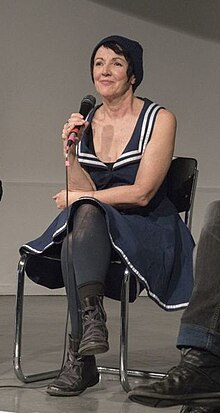Francesca da Rimini (aka Doll Yoko or GashGirl)[1] is an Australian artist. With Josephine Starrs, Julianne Pierce, and Virginia Barratt she co-founded VNS Matrix,[2][3] and the four artists coined the term cyberfeminist in 1991 to describe their art practice.[4][5][6] Da Rimini has been working in new media since 1984.[7]

In addition to her work with VNS Matrix,[8] Francesca da Rimini is known as the creator of online artwork Doll Yoko (1998)[9][10] and hypertext Fleshmeat (1998), which explores the virtuality of women online.[11]
She has created netspaces that feature a particular character or personae and contributes to many projects. She has participated and performed in notable conferences in the 1990s, including TISEA (Sydney 92), SIGGRAPH (Chicago 92), FISEA (Minneapolis 93), ISEA (Helsinki 94), YYZ (Toronto 95), Ars Electronica (Linz 96), and CyberCultures (Sydney 97).[12]
Her works are in collections, including the Victoria and Albert Museum,[13] Richard L. Sandor (USA), Museum of Contemporary Art, Helsinki, and Griffith Artworks (AUS).[12]
Francesca da Rimini is from Adelaide in Australia.[14]
References
edit- ^ "Doll Yoko". _it's coming straight for us. Retrieved 15 November 2023.
- ^ "Francesca da Rimini - Monoskop". monoskop.org. Monoskop. Retrieved 1 December 2019.
- ^ O'Farrell, Mary Ann; Texas A&M University, eds. (1999). Virtual gender: fantasies of subjectivity and embodiment ; [developed in response to issues considered at the 1996 Virtual Gender conference at Texas A&M University]. Ann Arbor, Mich: Univ. of Michigan Press. ISBN 978-0-472-06708-4.
- ^ Hurst, Cameron (2 January 2023). "VNS Matrix-Pilled: Three Propositions for Revisiting 1990s Cyberfeminist Art Now". Australian and New Zealand Journal of Art. 23 (1): 43–60. doi:10.1080/14434318.2023.2214588. ISSN 1443-4318.
- ^ Couey, Anna (2003). "Restructuring Power: Telecommunications Works Produced by Women". In Malloy, Judy (ed.). Women, art, and technology. Leonardo. Cambridge, Mass.: MIT Press. ISBN 978-0-262-13424-8.
- ^ Paasonen, Susanna (2005). Figures of fantasy: internet, women & cyberdiscourse. Digital formations. New York: Peter Lang. p. 189. ISBN 978-0-8204-7607-0.
According to the often-cited narrative, cyberfeminism came to be in Adelaide, Australia, in 1991, as VNS Matrix, a group of four female artists-Josephine Starrs, Francesca di Rimini, Julianne Pierce, and Virginia Barratt
- ^ ""about this writer:Doll Yoko (AKA Francesca da Rimini, AKA GashGirl)"". www.muse-apprentice-guild.com (August 2002). 2002.
- ^ Breeze, Mary-Anne (14 June 1998). "Attack of the CyberFeminists". SWITCH. 9 (1).
- ^ Jacobs, Katrien (2004). "Pornography in small places and other spaces". Cultural Studies. 18 (1): 67–83. doi:10.1080/0950238042000181610. ISSN 0950-2386.
- ^ Paniagua Zalbidea, Maya (1 September 2011). "Towards a Multimodal Analysis of da Rimini's Dollspace". CLCWeb: Comparative Literature and Culture. 13 (3). doi:10.7771/1481-4374.1799. ISSN 1481-4374.
- ^ Du Preez, Amanda (2009). Gendered Bodies and New Technologies: Rethinking Embodiment in a Cyber-era. Cambridge Scholars. p. 102. ISBN 9780735211766.
- ^ a b "Francesca da Rimini - Monoskop". monoskop.org. Retrieved 15 November 2023.
- ^ "Feminist art hiding in plain sight • V&A Blog". V&A Blog. 13 November 2023. Retrieved 1 February 2024.
- ^ Evans, Claire Lisa (2020). Broad band: the untold story of the women who made the Internet. New York: Penguin. ISBN 978-0-7352-1176-6.